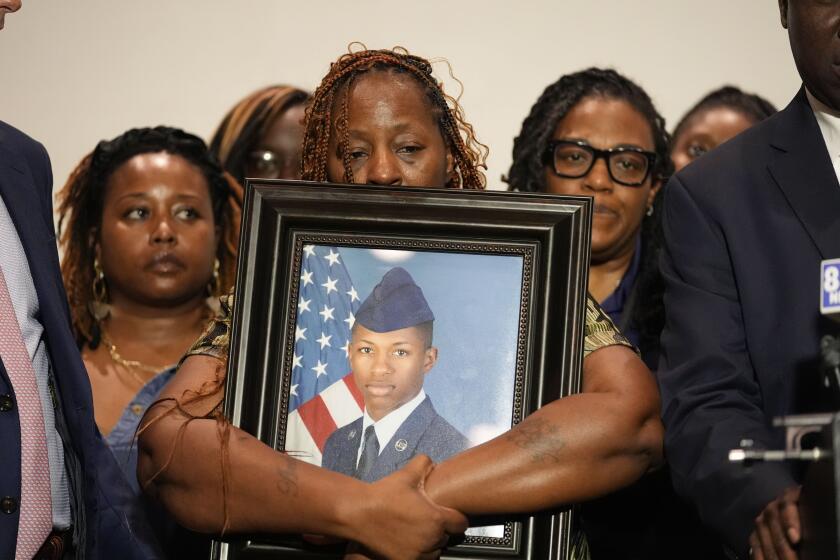Greatly Wrong on Two Assumptions : Soviet Union: Western observers keep citing ways for Gorbachev to fail. If they would look at his record, they’d see him getting stronger in his goal of changing the system.
The rumors that surfaced in the West last month about Mikhail Gorbachev’s imminent political demise were, as Mark Twain might have said, greatly exaggerated.
Once again, the Soviet leader has fended off any challenge to his power. Indeed, the changes approved by the Central Committee last Wednesday confirm that Gorbachev is politically stronger now than he has ever been. Although he might eventually be defeated if popular elections are held for the presidency, Gorbachev has left an indelible mark on the Soviet political system.
So why have so many Western observers been so consistently wrong about Gorbachev’s political fortunes? And why have Western journalists, scholars and public officials been worrying about the supposed precariousness of Gorbachev’s political future when in fact the Soviet leader has continued to amass political clout?
Part of the reason is that the Soviet political process remains so murky even in the age of glasnost . This breeds rumor and speculation. Yet, more important than the lack of information is the repeated failure of many Western observers to make careful use of information that is available. Most Western analysts still largely agree on two key assumptions: that Gorbachev hopes his reforms will save the Communist system, and that the recent turmoil in the Soviet Union and Eastern Europe is a threat to those reforms.
Evidence has been mounting for some time, however, that both assumptions are wrong. Initially, it seems, Gorbachev did hope to salvage the Communist system through a combination of administrative reshuffling, personnel changes and increased discipline and order. But before long, as the magnitude of Soviet economic problems became more apparent and as the early reforms of perestroika produced few results, Gorbachev apparently concluded that much more radical steps were needed. He also soon realized that he could never implement radical measures if he relied on the Communist Party.
Thus, by the spring of 1988, Gorbachev reluctantly began to alter the focus of perestroika . Rather than trying to save the Communist system, he would now seek gradually to do away with it. The creation of a new system that would be conducive to radical economic and political reform could succeed only if the existing order were simultaneously destroyed.
In mid-1988, Gorbachev launched his first major attack on the Communist system at the 19th Party Conference. The changes he secured at the conference, which were confirmed a few months later by a plenum of the Central Committee, resulted in a drastic scaling-back of the Central Party apparatus. These measures, and subsequent reforms transferring functions from the Communist Party to the state and the legislature, have steadily reduced party control over Soviet political and economic life. Gorbachev now hopes to accelerate that trend exponentially by creating a multiparty system and enabling the Supreme Soviet, which he chairs, to become the dominant political institution in the Soviet Union.
To reinforce this program of radical change at home, Gorbachev recognized that he would also have to abandon the foreign policies left over from his predecessors that tended to prop up the orthodox Communist system. Hence, after having escalated the war in Afghanistan for the first 2 1/2 years that he was in power, Gorbachev did an about-face in early 1988, agreeing to the complete withdrawal of Soviet troops. Within a year, all Soviet forces were indeed gone.
Similarly, Gorbachev initially sought to promote greater economic integration and an expansion of political and military collaboration in Eastern Europe. But by the spring of 1988 he had come to recognize that the maintenance of unpopular Communist regimes in the area was not only a drain on Soviet economic and military resources, but also an impediment to radical reform in the Soviet Union itself.
Consequently, Gorbachev decided, in effect, to abandon the whole notion of a “socialist commonwealth,” which had been used by previous Soviet leaders to “legitimize” the Communist model. By permitting, and even facilitating, the collapse of communism in one East European country after another, Gorbachev exposed how bankrupt the old model was. Far from being detrimental to him, this turmoil removed a key external prop on which his domestic opponents could rely.
Gorbachev’s desire to replace the existing system has been just as evident in his campaign against the Soviet military. Until the late 1980s, the armed forces were one of the greatest sources of pride for Soviet Communist officials. But over the last two to three years, Gorbachev has vastly downgraded the ceremonial role of the Soviet army and has tolerated, and indeed encouraged, scathing criticism of the military. He has also been steadily laying the groundwork to make large cutbacks in the armed forces and has already started to reduce military production. In the process, he is undermining yet another pillar of the old system that otherwise would be an obstacle to radical reform.
Even the recent turbulence among Soviet ethnic minorities can work to Gorbachev’s long-term advantage. It is probably true, as Gorbachev’s hard-line rival, Yegor K. Ligachev, recently claimed, that “the intensity of the ethnic issue came as a surprise to (the Politburo).” But the venting of these ethnic grievances has reinforced the attacks that Gorbachev himself is launching against the traditional Soviet system, facilitating the emergence of a new political order. Moreover, as British economist Philip Manson has pointed out, it seems likely that “a Soviet Union that is somewhat smaller, but a lot less internally divided, will be more capable of achieving the economic transformation that its present leaders seek.”
It is erroneous to believe that the mounting turmoil in the Soviet Union and Eastern Europe is a threat to Gorbachev’s reforms. Quite the contrary. Gorbachev’s aim is not to save the Communist system; he wants to dismantle it. Turmoil is not an obstacle to his plans, but a sign that they are working. The stronger Gorbachev has become, the more turmoil there has been as the destruction of the old order proceeds apace.
This is not to say that Gorbachev will now be able to overcome the formidable obstacles to economic revitalization, which is probably a hopeless task. Nor is it clear who might be elected president if Gorbachev himself does not prevail. But regardless of his ultimate fate, the Soviet leader has already gone a long way toward replacing the political system that would have denied any hope of economic success, for either him or a successor.
More to Read
Start your day right
Sign up for Essential California for news, features and recommendations from the L.A. Times and beyond in your inbox six days a week.
You may occasionally receive promotional content from the Los Angeles Times.






